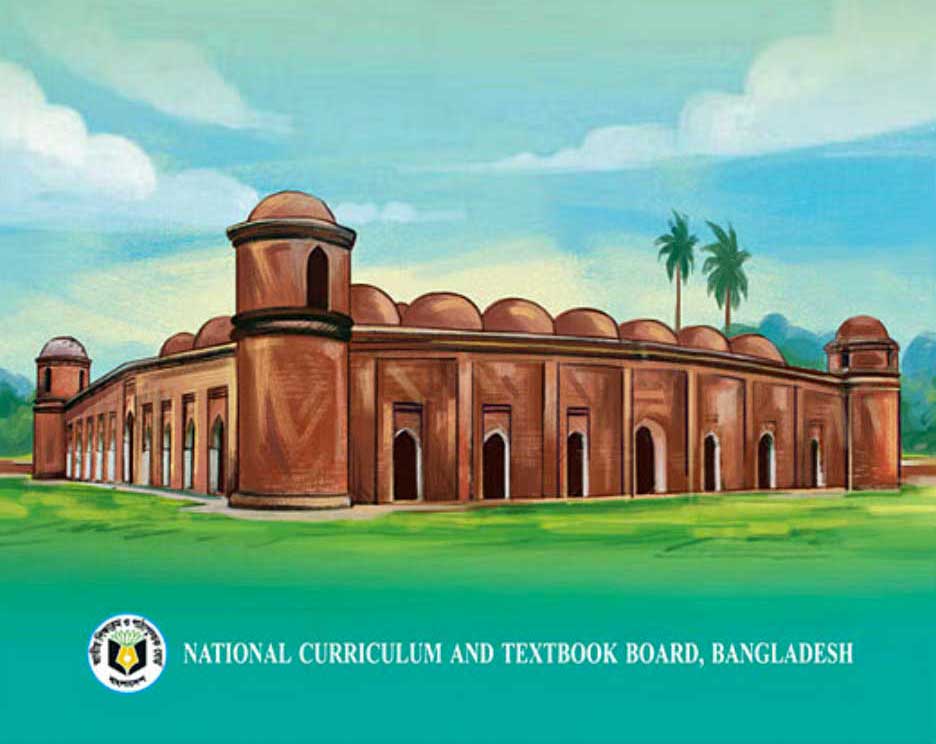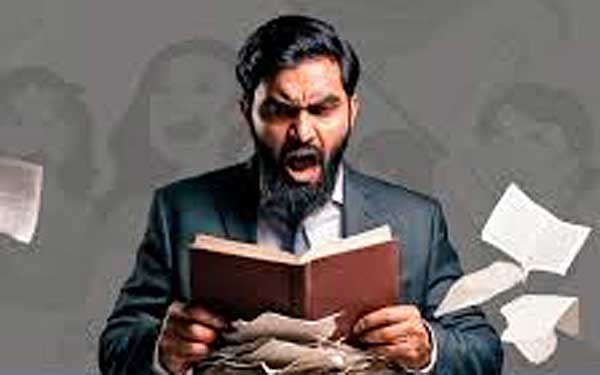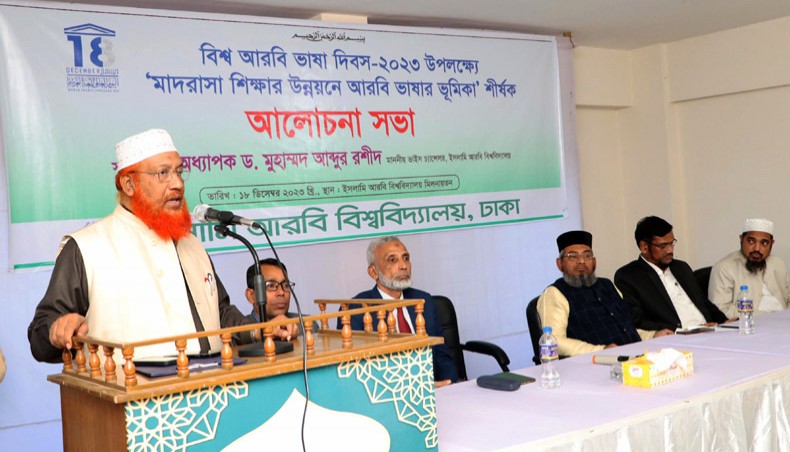Trans youth’s story in Grade 7 textbook triggers dispute in Bangladesh
Colin Stewart is a 45-year journalism veteran living in Southern…
Human rights groups say ‘The Story of Sharifa’ is important for youths and future generations.

Seventh-grade students in Bangladesh can learn about how transgender people live by studying a nationally approved textbook, but opponents of trans rights are fighting to have that section removed from a chapter on people’s similarities and differences.
A study committee, also known as a probe committee, recently recommended that the Ministry of Education remove the section “The Story of Sharifa” about the life of a trans youth.
Human rights organizations, including the Human Rights Forum Bangladesh (HRFB), JusticeMakers Bangladesh in France (JMBF) and Solidarity International LGBTQI+ (SIL), strongly disagreed with that recommendation, calling the study committee biased and arguing that “The Story of Sharifa” should remain. The text of “The Story of Sharifa” is reprinted below.
In its coverage of the HRFB’s protest, The Daily Star reported:
Refusing the recommendations made by the probe committee for the removal of “Sharifa’s Tale” from the seventh-grade social science textbook, Human Rights Forum Bangladesh (HRFB) demanded forming another unbiased probe committee to investigate the content.
HRFB issued a press release … requesting the education ministry to ignore the recommendations given by the probe committee of removing Sharifa’s Tale from textbook and demanded that Sharifa’s story is republished in a more up-to-date manner by correcting it through a new committee, if there were any mistakes or inconsistencies.
“The government should uphold values of diversity, non-discrimination, equality, tolerance, and co-existence by including stories of gender-diverse individuals in the textbooks to educate the future generation,” said SIL President Robert Simon in a joint statement with JMBF.
Excluding gender-diverse community members from educational content is unacceptable, said JMBF founder/president Shahanur Islam, because the Bangladesh Constitution guarantees equality and equal rights for all, regardless of gender, caste, religion, or any other distinction.
This is the disputed text about transgender Bangladeshis that the study committee objected to, saying that it contains errors, which were not specified:
The Story of Sharifa
Everyone called me a boy in my childhood but I eventually understood that even though my body was like that of a boy, I was actually a girl. I loved dressing up like girls. However, no one at home agreed to buy me the clothes I liked. I liked doing household chores with my mother, rather than going out with my father.
I used to secretly makeover myself with my sisters’ cosmetics. If I was caught. I would be scolded or even beaten. I wanted to play with girls more. Nevertheless at home. in school. the girls did not want to take me in sports with them. Even when I went to play with the boys they used to laugh at my voice and behaviour. Everyone at school, the neighbours, and even the people at home ignored me a lot. I used to suffer a lot thinking why I was like this. I felt very alone.
One day I met someone whom everyone called a girl but she thought of herself as a boy. I thought “this person is also like me.” She told me “We are not women or men. We are the third gender.” That person took me to a place where there were more people like us. And their ‘Guru Mom’ kept a watch on all of them. Going there, I did not feel alone. I did not feel that I was different from others.
I began to stay with those people. There the rules and customs were different from those of our home. Still, we lived like a family, sharing all the joys and sorrows among us. We live like a family, sharing everyone’s happiness and sorrow. We also feel bad for the people at home. So we go home from time to time.
I left home twenty years ago. Since then I have been earning money with my new family by blessing newborn babies and new brides and grooms. Sometimes I collect money from people by requesting them. However, we want to live like other common people in the society, to study, work and do business like them. Nevertheless, most people don’t want to mix with us, don’t want to give us work even if we have required qualifications. However, nowadays many people are sympathetic to us. Nowadays, many people like us are studying from their own homes.
There are people like us in all countries of the world. In many countries. they live like the rest of the society. The condition of our country is also changing. The Bangladesh government recognised us in 2013. The government and many nongovernment organisations are working for us. They are providing education and employment. They are working to change the attitude of society. Many third gender people like Nazrul Islam Ritu, Shammi Rani Chowdhury and Bipul Barman have achieved success in social and professional life.
That account contains the following errors, according to commentary in The Business Standard entitled “Why backlash over Sharifa’s tale makes the case for more inclusive textbooks”:

… The hijra identity is derived from someone being intersex – born with a combination of male and female biological traits. This identity doesn’t hinge on just demonstrating feminine characteristics. …
In no instance was the term “third gender” used officially. In fact, the community itself has distanced itself from the use of the term.
This is the joint statement from JMBF and SIL:
JMBF and SIL Express Deep Concern Over Recommendation to Remove ‘Sharifa’s Tale’ from Seventh-Grade Textbook
Paris, France: France-based human rights organizations JusticeMakers Bangladesh in France (JMBF) and Solidarity International LGBTQI+ (SIL) express deep concern over the recent recommendation by the expert committee formed by the Ministry of Education of Bangladesh to remove “Sharifa’s Tale” from the seventh-grade social science textbook.
JMBF and SIL strongly urge the Ministry of Education to reject this recommendation from the biased committee. Instead, they call for the formation of a new committee led by a Justice of the High Court Division of the Bangladesh Supreme Court. This new committee should include education specialists, social scientists, and members of civil society to thoroughly investigate the content in question.
According to a report published in Daily Prothom Alo on May 17, 2024, the high-level expert committee of the Ministry of Education submitted its report recommending the removal of “Sharifa’s Tale” from the chapter on similarities and differences between people in the seventh-grade history and social science books. The committee cited various inaccuracies as reasons for their recommendation. The Ministry of Education is now considering its next steps.

The chapter in question, part of the newly designed curriculum, includes a public awareness lesson on the transgender community, sparking debate. This issue gained attention when a part-time teacher at BRAC University tore the pages of the book during an event, with the video going viral on social media. In response, the education ministry formed a five-member probe committee on January 24, 2024, to review “Sharifa’s Tale”. The committee was convened by Abdur Rashid, Vice Chancellor of Islamic Arabic University, and included Mufti Maulana Kafil Uddin Sarkar from the Islamic Foundation, Professor Md. Mashiuzzaman from the National Curriculum and Textbook Board (NCTB), Professor Abdul Halim from the Dhaka University Institute of Education and Research (IER), and Professor Mohammad Abdur Rashid, Principal of Dhaka Aliya Madrasa.
Advocate Shahanur Islam, Founder and President of JusticeMakers Bangladesh in France, has protested the committee’s recommendations, stating that excluding gender-diverse community members from educational content is unacceptable, as the Constitution of the People’s Republic of Bangladesh guarantees equality and equal rights for all, regardless of gender, caste, religion, or any other distinction.
Robert Simon, President of Solidarity International LGBTQI+ (SIL), stated, “The government should uphold values of diversity, non-discrimination, equality, tolerance, and co-existence by including stories of gender-diverse individuals in the textbooks to educate the future generation.”
JusticeMakers Bangladesh in France and Solidarity International LGBTQI+ stand firm in advocating for inclusive education that reflects human rights and constitutional principles of equality and non-discrimination, ensuring that all students, regardless of their gender identity, are represented and respected in educational materials.




